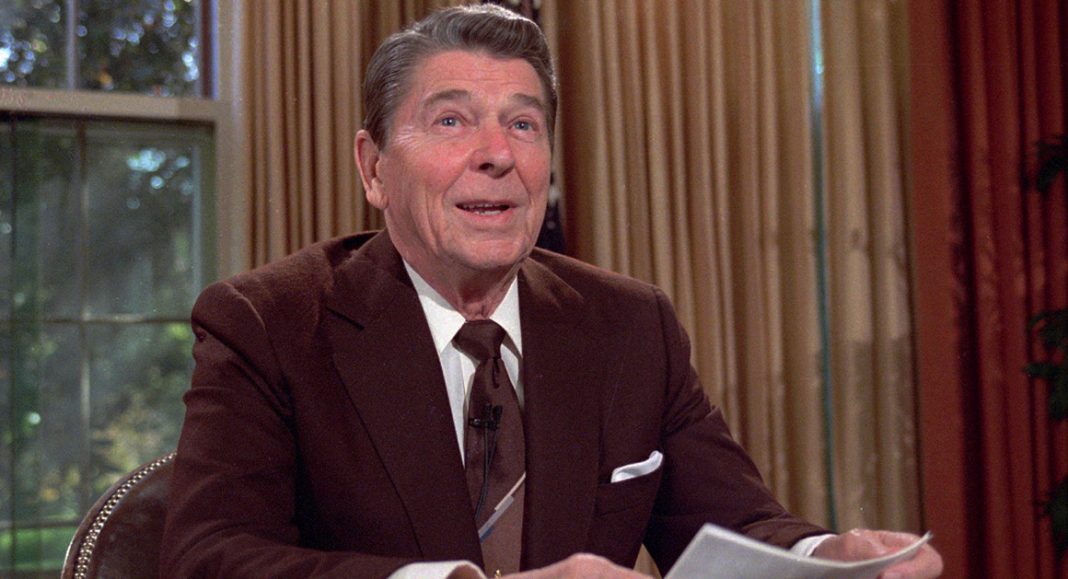On Iran, Trump Should Be Like Reagan
في تعامله مع إيران على ترامب أن يتبع نموذج تعامل ريغن مع روسيا
Richard Goldberg and Dennis B. Ross/Politico Magazine/January 09, 2018
The president can sanction Iran while strengthening the nuclear deal. History shows it can be done.
In just three days, President Donald Trump must once again decide what to do about the much-debated Iran nuclear deal. Most are framing his choice as a binary one: Kill it or keep it? Although the emergence of a popular uprising against the Iranian regime undoubtedly complicates the politics of Trump’s decision, the president should reject such false choices and find a path that can sustain broad consensus at home and abroad. There is always a middle path to discover in foreign policy—and, in this case, a path that can uphold American values, defend our national security and keep our commitments to close allies.
This basic idea is not ours alone; it can be credited to President Ronald Reagan, who successfully negotiated a major arms control agreement with the Soviet Union—all while publicly calling it an “evil empire,” building up America’s strategic deterrence, promoting regime change and applying economic pressure tied to the Soviet record on human rights.
Republicans and Democrats may differ over the strengths and weaknesses of the Joint Comprehensive Plan of Action, as the Iran nuclear deal is formally known. But the White House, Congress and our allies share legitimate concerns—most significantly, the difficulty of fully verifying Iran’s compliance with the agreement. Iran’s ballistic missile program, which was not part of the JCPOA, continues to make alarming progress. And so-called sunset provisions in the deal could allow Iran to build a more robust uranium enrichment capability in a few short years, once certain restrictions expire.
But where we should not differ is in our commitment to core American values—human rights and democracy. It is inside this commitment where we can find a way forward together.
In Iran today, people have been taking to the streets to denounce a regime that diverts the resources of its population toward terrorism, regional destabilization and proliferation while denying its citizens the basic values of freedom and democracy the West takes for granted. The Iranian people, it appears, have finally had enough of a financial system that launders their small but hard-earned wages to export terror, Shia militias and missiles to foreign lands. They’ve had enough of a regime that cares more about investing in the religious trusts—known in Farsi as bonyads—and the very same Revolutionary Guard now deployed against them.
The Iranian protesters are making a statement and we should not ignore it. The president would be well within his rights under the JCPOA and international law to follow Reagan’s example and answer them with action. Just as the Iranian regime feels free to spread its power and reach within the region notwithstanding the JCPOA, so should the United States and Europe feel free to impose sanctions tied to human rights, terror and missiles notwithstanding the same.
The sanctions relief provided under the JCPOA should not be interpreted as a blanket immunity for Iranian officials, banks and other government instrumentalities to expand their illicit activities. If such a person or entity is found to be connected to the Revolutionary Guard, terrorism, missile proliferation and human rights abuses, it most certainly can and should be subject to sanctions—even if sanctions for that person or entity were initially suspended by the JCPOA.
The JCPOA must not prevent us from fulfilling our international obligations on human rights, terrorism and proliferation. It cannot handcuff the United States and its allies from using all available means of state power to stop these illicit activities. Indeed, the American people were repeatedly assured by then-Secretary of State John Kerry that nothing in the JCPOA precluded the United States from imposing sanctions for such non-nuclear activities.
Many international agreements throughout history were hatched by adopting vague language that could be interpreted in different ways by different parties. That is especially true for arms-control agreements, and the JCPOA is no exception. The administration would be wise to try to convince the Europeans that non-nuclear sanctions are an acceptable and highly effective way of raising both the internal and external costs to the Iranian regime for its aggressive behavior.
Of course, the Iranian dictators won’t like it. They might even claim such sanctions violate the nuclear deal and threaten to abandon their commitments. But they would be wrong—and they alone would bear the blame and consequences of exiting the JCPOA.
Next week’s presidential decision needs to rise above partisanship in a manner that galvanizes the support of the free world. Silence is not an option, nor is keeping money flowing to regime officials, banks and government entities that suppress the basic rights of the Iranian people. Those managing the Iranian economy and those financial institutions in Iran that seek to do business with the international community should know they will pay a price for engaging in illicit behavior.
*Richard Goldberg, an architect of congressionally enacted sanctions against Iran, is senior adviser at the Foundation for Defense of Democracies.






















